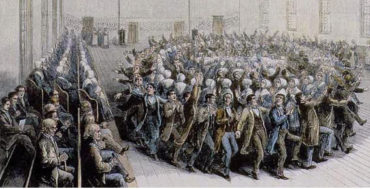With Chris Jennings, an author who grew up in New York City. He graduated from Deep Springs College and Wesleyan University. He lives in Northern California with his dog. His most recent book is Paradise Now: The Story of American Utopianism.
About the book:
 By any measure, Ann Lee, the illiterate daughter of a Manchester blacksmith, led one of the most audacious and improbable lives of the 18th century. Born in 1736, she came of age in the fetid, soul-destroying crucible of English industrialization. But in religion, Lee discovered her native boldness and charisma. She became a prophet and, in 1774, led a small band of followers across the Atlantic. They became known as Shakers. And from a mean cabin in upstate New York they formed a society that would draw thousands into communal villages across much of the United States. Lee did not live to survey her realm. But her social conscience — forged in the bleak shadow of the Manchester mills — animated Shaker communities well into the 20th century.
By any measure, Ann Lee, the illiterate daughter of a Manchester blacksmith, led one of the most audacious and improbable lives of the 18th century. Born in 1736, she came of age in the fetid, soul-destroying crucible of English industrialization. But in religion, Lee discovered her native boldness and charisma. She became a prophet and, in 1774, led a small band of followers across the Atlantic. They became known as Shakers. And from a mean cabin in upstate New York they formed a society that would draw thousands into communal villages across much of the United States. Lee did not live to survey her realm. But her social conscience — forged in the bleak shadow of the Manchester mills — animated Shaker communities well into the 20th century.
Irrepressible as ever, the ghost of Ann Lee hovers over every page of Chris Jennings’s uncommonly smart and beautifully written book “Paradise Now.” In a sense, this is hardly surprising. All utopian experiments would seem to invite comparison with the Shakers, whose advocacy of simple living, hard work, shared property and gender equality holds tremendous modern appeal (in certain circles, anyway).
But in this persuasive telling by Jennings, a writer living in Northern California, the Shakers’ influence found its fullest expression in four other distinct communities started during the first half of the 19th century: New Harmony, the Fourierist Phalanxes, Icaria and Oneida. All, he argues, were inspired by Ann Lee, who preached that salvation lay in creating heaven on earth. By turns elegiac and colloquial, “Paradise Now” chronicles the ascent and demise of these “fellow travelers” — the Shakers among them — as they chased their perfectionist ideals. –

